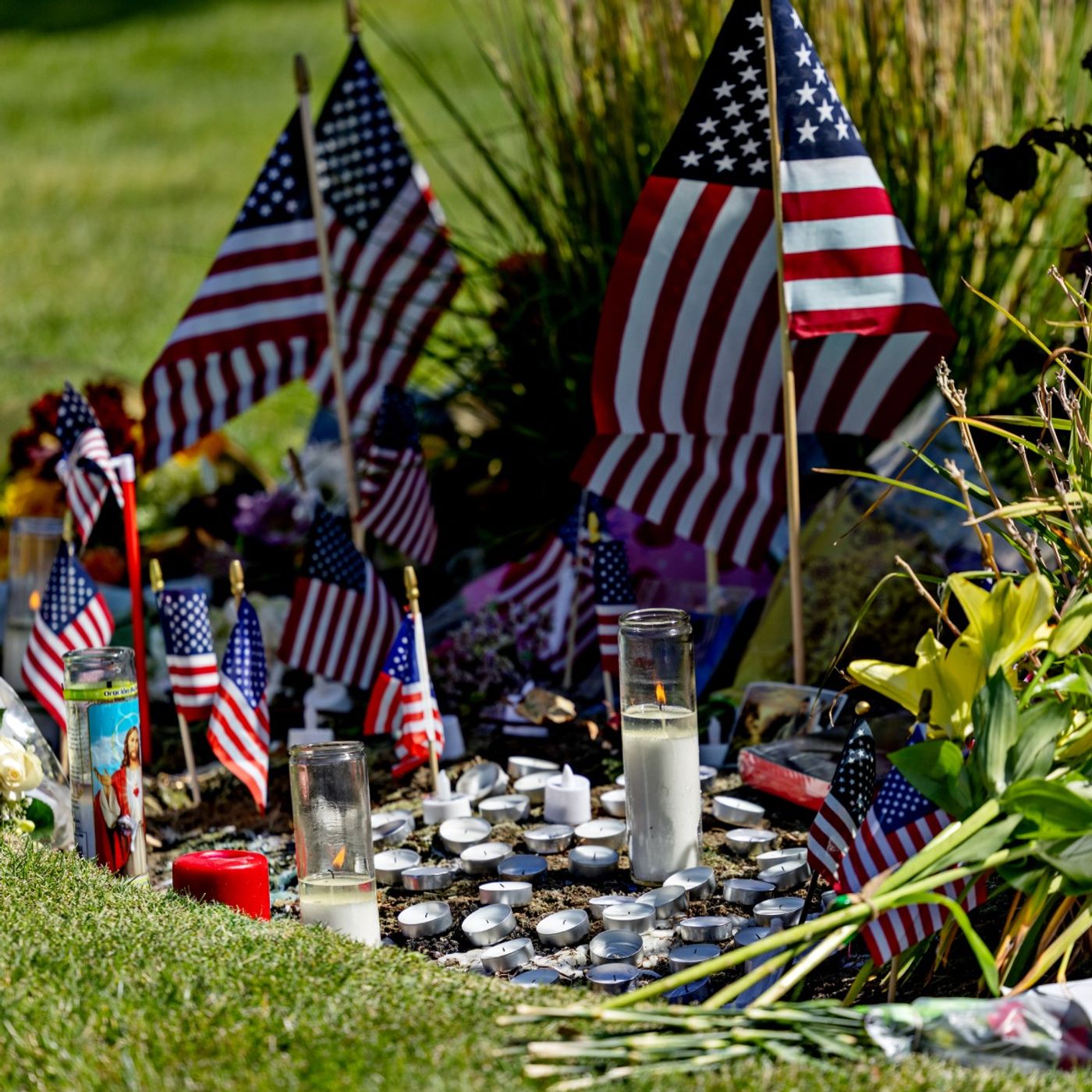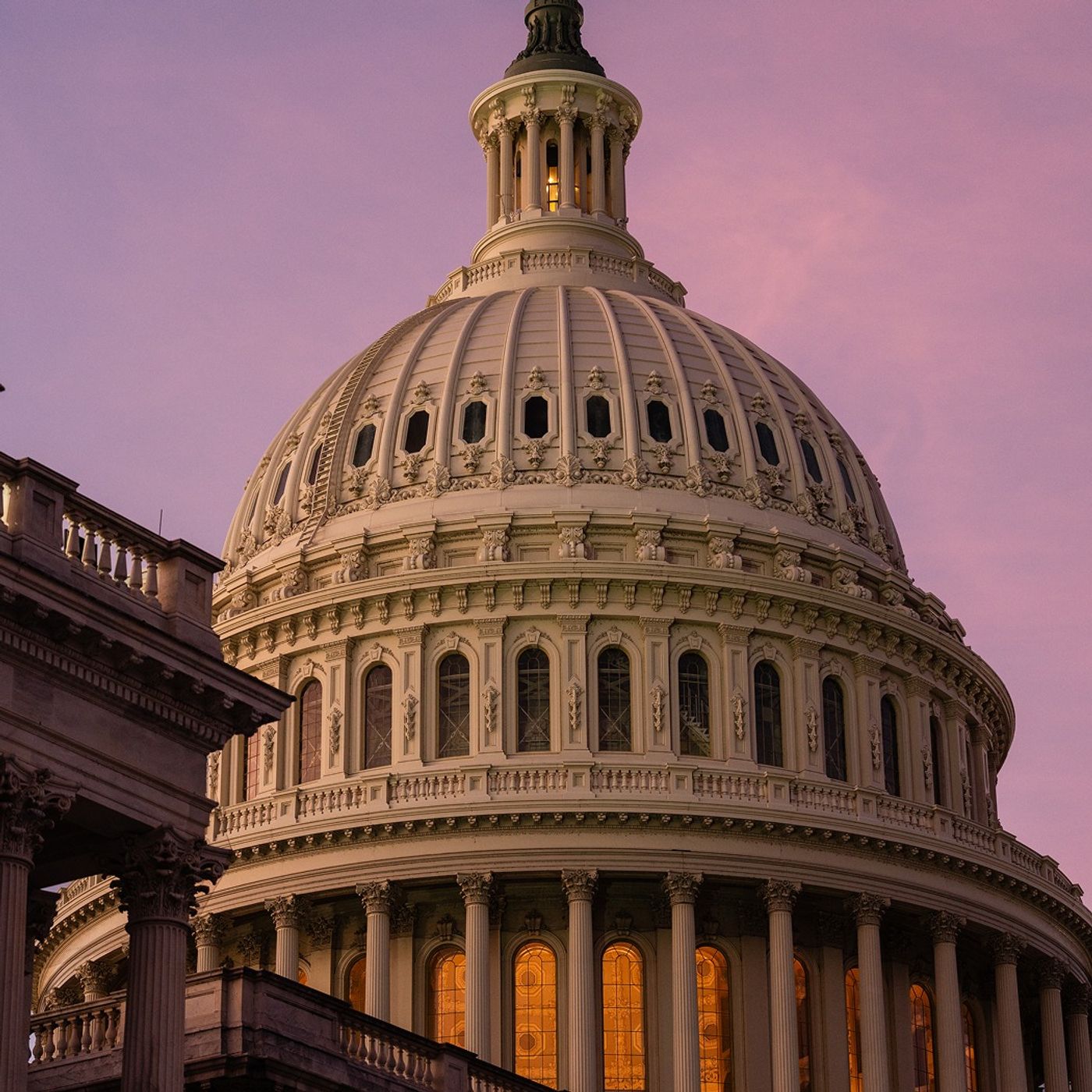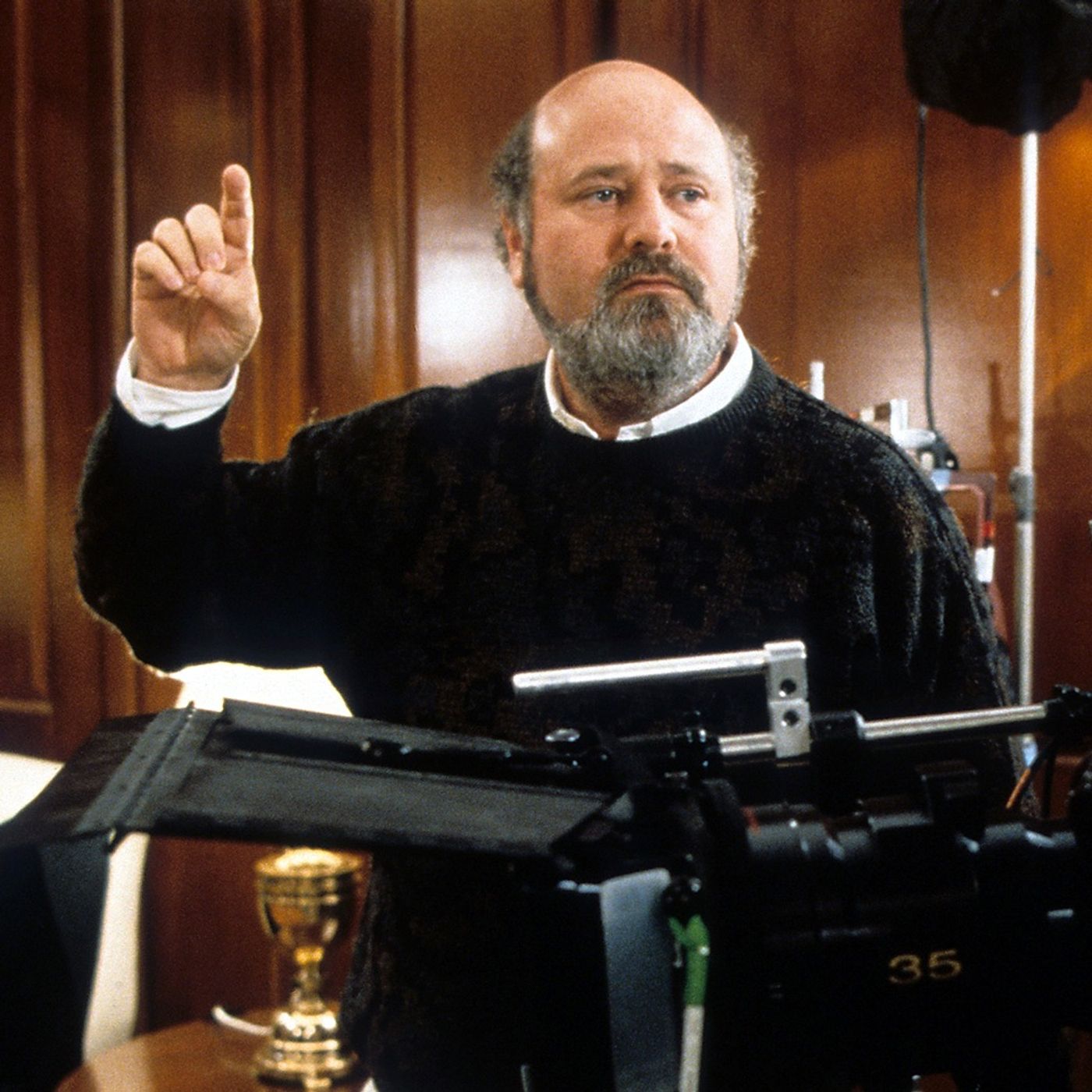The Aftermath of Charlie Kirk’s Death
Nicholas Bogel-Borroughs, an investigative reporter at The New York Times, discusses why the police are struggling to answer basic questions about the shooter. And Alan Feuer, who covers extremism and political violence, discusses how the assassination might become a turning point for the conservative movement.
Press play and read along
Transcript
Speaker 1 Brought to you by the Capital One Saver Card. With Saver, you earn unlimited 3% cash back on dining, entertainment, and at grocery stores.
Speaker 1 That's unlimited cash back on ordering takeout from home or unlimited cash back on tickets to concerts and games. So grab a bite, grab a seat, and earn unlimited 3% cash back with the Saver card.
Speaker 1
Capital One. What's in your wallet? Terms apply.
See capitalone.com for details.
Speaker 2 From the New York Times, I'm Michael Bolvaro. This is the daily.
Speaker 2 Today, the political fallout from Charlie Kirk's murder and the manhunt for his killer.
Speaker 2 I speak with my colleague, Nicholas Bogle Burroughs, about why police are struggling to answer basic questions about the shooter and to Alan Foyer about how the assassination may be a turning point for the conservative movement.
Speaker 2 It's Friday, September 12th.
Speaker 2 Nick, we are talking to you at about 6.35 p.m. Eastern time.
Speaker 2 And I just want to start by asking you what we know about who carried out this assassination against Charlie Kirk and what we know about why they may have carried this out.
Speaker 3 We know incredibly little about both of those questions. We do not know who carried out this attack and we don't know that person's motivations.
Speaker 3 It's been 30 hours since this assassination took place and everyone's seen all these videos that have come out from the scene.
Speaker 3 There's an incredible wealth of information about what happened, but almost nothing about the person who did this.
Speaker 2 And it felt like from the very beginning, there was a lot of confusion and mistaken identity.
Speaker 3 Absolutely. I mean, as we've seen time and time again, unfortunately, there is a very quick response on the part of people online, self-identified sleuths to try to figure out who it could have been.
Speaker 3 And in this case, also some wrong guesses by the police, it seems. There was two instances where people were taken into custody and questioned.
Speaker 3 And in both cases, the police determined that those people had nothing to do with it and they were released.
Speaker 2 And were they both people on the scene? Is that the primary rationale for detaining them?
Speaker 3 Yeah, we don't know exactly why each of these people were detained, but one was an older man who's a political gadfly in Utah.
Speaker 3 People had a lot of familiarity with him, and he was cuffed right away, questioned presumably about what had happened, and then, determined to not have anything to do with this.
Speaker 3 The other person was a guy who seemed to just be in attendance of this rally.
Speaker 3 I don't know why that person was brought in by the police, but they were very clear today that he was questioned and let go. And they said, you know, please don't harass him and his family.
Speaker 2 We should say in both cases, the names of these two men get widely circulated and their reputations widely maligned. And it turns out that they had nothing to do with it.
Speaker 3 That's right. And what happened then on Thursday morning was the police said that they had found on various surveillance video images of the person that they believed was the gunman.
Speaker 3 This is now the third person that they
Speaker 3 considered a person of interest. They said, if we can't identify him on our own, we will seek the media's help in dispersing this picture.
Speaker 3 Lo and behold, a few hours later, the FBI posts two grainy surveillance images onto social media of the person that they believe is the suspect.
Speaker 3 So that's a pretty clear indication that they were not able to identify him through other means and we're now seeking the public's help.
Speaker 2 I mean, what's your sense, Nick, about how it's possible we've gotten into the place we are
Speaker 2 where somebody carried out the assassination of Charlie Kirk, this enormously influential conservative leader, in an exceptionally public place and was able to flee with what appears to have been such ease?
Speaker 3 I think it helps to understand it by considering that it's not like an assassination attempt on Trump.
Speaker 3 It's not like a rally where you have the Secret Service and you have, you know, hundreds of police officers or, you know, extensive planning about the environment around a stage.
Speaker 3 This is an event that brought 3,000 people to a Utah college campus, and the university police chief said that they had six officers working security, plus Charlie Kirk's security team that he brings with him.
Speaker 3 Charlie Kirk is someone who's gone to a huge number of campuses, has had very controversial events, events that bring a lot of anger and support.
Speaker 3 And it's not the kind of thing that is planned for in the same way, though, that a presidential rally or a political rally would be.
Speaker 2 Right.
Speaker 2 This ratio you're describing of police to 3,000 crowd suggests that the people involved in putting this event together and even the security team around Charlie Kirk just didn't see him as a major target.
Speaker 3 I think that's right. And I think also if you look at what the police have outlined is happening, I mean, this is a pretty extreme attack.
Speaker 3 This is a single gunshot from the roof of a building from far behind where the crowd is.
Speaker 2 Right. I mean, you're starting to do this, but describe, in the absence of an understanding of who did this and why they did it,
Speaker 2 what the police do know about the movements of this shooter who did what he did and so far has gotten away with it.
Speaker 3
Right. So they say that they have surveillance footage that shows him arriving near the campus around 11:52 a.m.
local time.
Speaker 3 That they then can track him as he moves into a building and up a stairwell and onto the roof of this building that looks down over a basically amphitheater where Charlie Kirk was speaking.
Speaker 2 Right, kind of an outdoor quad-looking space on campus.
Speaker 3 Exactly. And up on this roof, the shooter has a high-powered bolt-action rifle.
Speaker 3 The police say he fired that single shot and then ran to another side of the roof where he was able to jump down from it.
Speaker 2 And I recall that there is some video of him running across the roof.
Speaker 3 Right. There's a video that captures someone, presumably the shooter, running across the roof right after the shooting has taken place.
Speaker 3 Just looking, exploring the geography of this campus has been really interesting because it really looks like the gunman would have had the ability to take that shot, go back to another side of the roof, jump down, and then very, very quickly be off campus.
Speaker 2 He's basically on the edge of campus.
Speaker 3 The police said that they recovered that rifle that they think he used from a wooded area right near the campus.
Speaker 3 And they've spent much of the last 30 hours combing through this area, speaking with neighbors, speaking with folks who who live there.
Speaker 2 Do we know anything about how he left the campus? What direction he went in? If it was on foot, if it was in a car, anything.
Speaker 3 The police have not been clear about those details or whether they know those details. The one thing that they have indicated is that he went through some wooded area where he ditched the gun.
Speaker 2 That's it.
Speaker 3 That's it.
Speaker 2 There has been a report circulating throughout Thursday that I want to better understand. It revolves around the casings from the weapon that was fired at this scene, from this rifle.
Speaker 2 And I wonder if you can tell us about that and
Speaker 2 how much attention we should be paying to those casings.
Speaker 3 To be very clear, the truth is I don't know yet. And I think very few people do.
Speaker 3 There's been reporting in a couple of outlets that suggest that some of the ammunition that was left with the gun was engraved with, and this is the phrasing that they're using, transgender anti-fascist etiology.
Speaker 3 Right.
Speaker 2 And this made its way into a law enforcement bulletin.
Speaker 3
Right. This is something that was circulated among some group of law enforcement.
Our reporting has been very unclear on how accurate that is. And
Speaker 3 at this point, there's very little evidence of any motive. I also haven't seen in any of those reports what that actual marking that's supposedly on the ammunition would actually say.
Speaker 3 It's only been described in this sort of vague way, second or third hand. You know, we have a whole team of reporters trying to figure it out.
Speaker 3 We're all very interested in what the motive is for this attack. And right now, we don't know.
Speaker 2 You've covered a lot of manhunts in your career. Does everything you're describing here feel typical?
Speaker 2 Sometimes people do get away for some period of time. Frequently, they're caught in the end.
Speaker 2 Or does this all feel, especially the confusion in the beginning, the detentions and the releases, a little bit bumbling, especially given the stakes and the profile of Charlie Kirk?
Speaker 3 When something this high profile happens, you certainly expect that the person who carried it out is going to be taken into custody very quickly.
Speaker 3
The unique aspect of this is the fact that we have no name, that we don't know who did this. It's not just we're looking for this guy.
It's we want to know who this guy is.
Speaker 3 I think that's very unusual. When I think of other manhunts in recent years in Maine or Montana, it was always, here's the guy we're looking for, and we're narrowing in on him.
Speaker 3
And maybe it takes a few days. In almost every manhunt I've covered, the person has been found very close to where the crime took place.
They've been scrounging for food or in someone's backyard.
Speaker 3 I don't want to speculate too much, but if this person had a plan before carrying this out, there's a lot of things you can do in 30 hours when the police don't know who you are.
Speaker 3
I mean, you could try to leave the country. You could try to leave the state.
You could drive a far distance. You could get on a train.
Speaker 3 There's a lot less risk when the police don't have a flag out for your name. Aaron Powell.
Speaker 2 I have to wonder if that helps explain why over the past few hours we have seen the director of the FBI, Cash Patel, and his number two, Dan Bongino, both prominent conservative figures in their own right, announce that they are headed to Utah to oversee this investigation.
Speaker 2 Should that be seen as a sign that they are frustrated with where this investigation stands and how little has been confirmed?
Speaker 3 I think it could be that. I think this is, of course, just an incredibly high-profile investigation into an assassination.
Speaker 3 I think you're right that the pressure is certainly on the FBI director, it was the person who was saying shortly after the shooting that there was a subject in custody, and that ended up being one of the two people that they had to release.
Speaker 3 But also, this is someone, Charlie Kirk, who was very close with many members of Trump's administration, with Trump himself.
Speaker 3 And so you have to imagine that there's pressure from Trump all the way down for the FBI to solve this crime.
Speaker 3 And I think until that happens, there's going to be a void there, and there's going to be speculation about the motive and other things that increasingly fills that void.
Speaker 2 Well, Nick, thank you very much.
Speaker 3 Thank you, Michael.
Speaker 2 After the break, Alan Foyer on the political fallout from Kirk's assassination.
Speaker 2 We'll be right back.
Speaker 1
Support for this podcast comes from GoodRX. Prescriptions keep getting pricier and more of a hassle to fill.
It's like the Wild West getting prescription medication these days.
Speaker 1 Good thing GoodRX wrangles it for you. From telehealth to wellness tips to easy discounts of up to 80%,
Speaker 1
GoodRX is riding with you at every step. GoodRX is not insurance, but if you have insurance or Medicare, GoodRX may beat your copay.
Save time and money on prescriptions at goodrx.com/slash the daily.
Speaker 2 The New York Times app has all this stuff that you may not have seen.
Speaker 2
The way the tabs are at the top with all of the different sections, I can immediately navigate to something that matches what I'm feeling. I hold a games always.
Doing the mini, doing the wordle.
Speaker 4 I loved how much content it exposed me to, things that I never would have thought to turn to a news app for.
Speaker 2 This app is essential.
Speaker 4
The New York Times app. All of the times, all in one place.
Download it now at nytimes.com/slash app.
Speaker 2 Alan, it feels like from the moment that Charlie Kirk was assassinated, it was pretty clear, given who he was, given the volatility of the moment, that the reactions to this were going to be big and they were going to be very closely watched on both sides of the political aisle, from official party leaders to the fringes.
Speaker 2 And that has absolutely been the case. And I'm curious what has struck you about it so far.
Speaker 2 Sure. So if you want to start on the left, probably the most palpable reaction was a very rapid and vocal condemnation of this assassination by establishment Democrats.
Speaker 6 Obviously, a flurry of social media posts from political leaders following the news of the shooting.
Speaker 2 Political elected officials from Gavin Newsom.
Speaker 7 Governor Gavin Newsom putting out a statement saying, quote, the attack on Charlie Kirk is disgusting, vile, and reprehensible to Barack Obama.
Speaker 8 President Obama here saying, we don't know yet what motivated the person who shot and killed Charlie Kirk, but this kind of despicable violence has no place in our democracy.
Speaker 2 To Senator Chris Murphy, who took a moment on the floor of the Senate
Speaker 2
to condemn this attack. We are all horrified watching images and following the news out of Utah.
And
Speaker 2 we are sending all of our thoughts to Mr. Kirk, to his family.
Speaker 2 So, I mean, that said, were there people on the internet in a kind of gleeful way celebrating the killing of Charlie Kirk? Do you support his death? I do. Yes, there were.
Speaker 2 You support Charlie Kirk being killed? Yes, I do.
Speaker 2 Were there people who held up things that Charlie Kirk had said during his career, even in the moments after his death, to throw his own words back back in his face about things like
Speaker 2 his belief in gun rights.
Speaker 9 So next time someone says, hmm, that's a weird hill to die on, consider that you might actually have to die on that hill.
Speaker 2 Yes, yes, there were. Right.
Speaker 2 In fact, some of that was happening even in the comments section of New York Times articles, this non-official, kind of very online liberal Democratic viewpoint that Charlie Kirk reaped what he sowed.
Speaker 2
That was absolutely out there. Yes.
But it was not, you're saying, at all, the official reaction of elected Democrats. No, there was there, I think, there was a pretty stark divide.
Speaker 2 I thought, I think you saw official Democrats, people who actually hold power, really move quickly to condemn this. But on the right, things looked very different.
Speaker 2 And this murder Charlotte Kirk right here in Utah. I'm so freaking pissed right now.
Speaker 2 I love that guy.
Speaker 2 What began as sort of shock and sorrow, it transformed pretty quickly. You liberal, progressive, deranged animals.
Speaker 2 Into a kind of almost vengeful rage.
Speaker 2 And who is, who's saying that? Who's articulating that message? Well, I mean, you've got, you know, right-wing social media influencers, podcasters.
Speaker 6 We actually are being victimized.
Speaker 7 There's no other word for what happened to Charlie Kirk yesterday. Hunted.
Speaker 6 He was hunted.
Speaker 2 And the comments kind of range from, we're either in a civil war. And this video is for the fucking liberals.
Speaker 2
It's war, motherfuckers. We're coming for you.
Or if we're not, we should be. Democrats own what happened today.
Speaker 2 You've got members of Congress speaking inside the Capitol.
Speaker 10 If we didn't know it already, there is no longer any middle ground.
Speaker 2 Saying that there is no longer any middle ground left, that people on the left may, there may be some who are well-meaning, but the ideology itself
Speaker 2 is pure evil.
Speaker 10 And they literally will kill those with whom they disagree, just as their predecessor leftists, Marx and Stalin, and Lenin and Pol Pot and Fidel Castro did.
Speaker 2 And this goes all the way up to President Trump, who offered remarks about Kirk's assassination.
Speaker 12 It's long past time for all Americans and the media to confront the fact that violence and murder are the tragic consequence of demonizing those with whom you disagree day after day, year after year.
Speaker 2 Where he kind of
Speaker 2 on the one hand said that violence like this
Speaker 2 emerges from demonizing
Speaker 2 people who don't agree with you, but then sort of rapidly pivoted.
Speaker 12 For years, those on the radical left have compared wonderful wonderful americans like charlie to nazis and the world's worst mass murderers and criminals this kind of rhetoric is directly responsible for the terrorism that we're seeing in our country today to blaming the assassination my administration on what he called the radical left my administration will find each and every one of those who contributed to this atrocity and to other political violence, including the organizations that fund it and support it, as well as those who go after our judges, law enforcement officials, and everyone else who brings order to our country.
Speaker 2
And so, in some sense, all of this taken collectively, it looks like people were identifying a target before the authorities had identified. a suspect.
Right.
Speaker 2 That's what seems most distinctive, and if we're being honest, problematic about the response from both the activist and official Republican world is a kind of presupposition that whatever happened here to Charlie Kirk, it represents an intentional effort to wound the conservative movement, which could be true.
Speaker 2
We just have no idea. And all the way up to the president comes this message, this is without ambiguity what happened, and the left must be held responsible for it and the left exclusively.
Yes.
Speaker 2 And so when you really drill down on what President Trump was saying about Charlie Kirk's assassination, you know, you've got him sort of blaming the radical left for creating the conditions that allowed, that gave permission for somebody to assassinate this guy.
Speaker 2 And moreover, that he was going to punish people that he felt were responsible for it in a way that was very hard to understand
Speaker 2 beyond his seeming desire to point a finger at his political adversaries.
Speaker 2 So what's remarkable is that on the right, you kind of have a synthesis of, you know, the people outside of power and the people inside of power more or less saying the same thing that, you know, their adversaries adversaries are to blame and something must be done about it.
Speaker 2 Where, as on the other side of the aisle, there's a real divide between people who were sort of espousing violence or using kind of ghoulishly gleeful rhetoric.
Speaker 2 Those were the fringes that were very distinct from those in power, because the establishment Democrats, again, like we said, were sort of ironclad and vocal in their condemnation of this.
Speaker 2
And I think that reflects a larger dynamic that is important, which is the kind of collapse on the right between the fringe and those in power. Right.
They've become suffused.
Speaker 2 Look, it's worth recalling that a couple of weeks ago, Stephen Miller, who is arguably Trump's most powerful aide in the White House, called the Democratic Party, the entire Democratic Party, a domestic extremist organization.
Speaker 2
A stunning statement. Yes.
And one that was, you know, sort of rehashed and re-echoed in the wake of the Kirk assassination.
Speaker 2 So this is not, you know, identifying a single suspect who may or may not be of the left, who needs to be punished for a specific crime. This is something different.
Speaker 2 This is sort of a wholesale demonization of
Speaker 2 one's political adversaries. The question is, does that invite action?
Speaker 2 Because whether it's the fringe all the way up through Congress and the president, there is now language that suggests that the left, that the Democratic Party, in the words of Stephen Miller, are a kind of existential threat.
Speaker 2 Well, when you talk to people who study political violence, they tend to tell you that there are three things that you need to get actual violence on the ground.
Speaker 2
One of them is a riled up populace, right? So check, we have that. Two, there has to be a sort of triggering event, right? Well, check.
The assassination of Charlie Kirk.
Speaker 2 Charlie Kirk's assassination is clearly that. It has landed with an incredible emotional intensity on the right.
Speaker 2 And the third thing that experts will tell you is neat is a kind of focal point for the action.
Speaker 2 And Alan, when Trump or Miller or any of the people we're talking about here, when they blame the left with a broad brush, but very clearly blame the left for something like the assassination of Charlie Kirk, are they, intentionally or not, offering a focal point?
Speaker 2 I'm not sure that that constitutes a focal point. I think it has to be something a little more specific, right?
Speaker 2 So just like if you imagine January 6th, 2021, there was a giant event, a gathering where people went to the Capitol after having spent three months being very spun up about a stolen election, right?
Speaker 2 So you had a rowed up population, you know, you had a stolen election allegedly in their minds, and then you had a focal point a single day, a mass gathering at the Capitol.
Speaker 2
I mean, I don't know that there's a focal point staring us in the face at the moment. Right.
Which is not to say that this is not playing with fire. It's just where this goes next.
Speaker 2 I honestly don't think anybody knows.
Speaker 2 The trouble with blaming rhetoric for causing violence is that the link is pretty tenuous, right?
Speaker 2 The fact is, not many people are sort of characterologically inclined to pick up a gun or plant a bomb or commit violence.
Speaker 2 However, the kind of ambient rhetoric that we have been hearing blaming one side or blaming the other in, you know, kind of like sweepingly violent ways itself, it just sort of lowers the human inhibitions to committing, but it creates an environment that increasingly encourages people to act.
Speaker 2
Which is not to say that it justifies violence. It just may make it more likely.
It may create the circumstances in which it
Speaker 2 happens.
Speaker 2 And it feels like there's a bit of an irony here because the president in his pursuit of what he sees as left-wing rhetoric that he believes is engendering violence, may be lowering the bar for violence himself, given the nature of the pulpit he has.
Speaker 2 Well, look, I think what you're describing is a cycle here that needs to be broken in the end.
Speaker 2 And
Speaker 2 the use of that incendiary rhetoric is just a bad thing for democracy, period, because the more that we permit ourselves, you know, as a country, as a whole, to engage in this kind of violent rhetoric, the more we invite violence itself.
Speaker 2 Well, Alan, thank you very much. Thanks for having me as always, Michael.
Speaker 2 On Thursday afternoon, in a sign of Kirk's importance to the Trump administration, Vice President J.D.
Speaker 2 Vance flew to Utah to greet Kirk's casket at the airport and to return it aboard Air Force 2 to Kirk's family in Arizona.
Speaker 2 We'll be right back.
Speaker 5 This podcast is supported by the American Petroleum Institute. Energy demand is rising, and the infrastructure we build today will power generations to come.
Speaker 5 We can deliver affordable, reliable, and innovative energy solutions for all Americans, but we need to overhaul our broken permitting process to make that happen.
Speaker 5 It's time to modernize and build, because when America builds, America wins. Read API's plan to secure America's future at permittingreformnow.org.
Speaker 2 Here's what else you need to know today.
Speaker 2 On Thursday, Brazil's Supreme Court convicted the country's former president, Jair Bolsonaro, of overseeing a failed conspiracy to overturn the results of the 2022 election, which Bolsonaro had lost.
Speaker 2 In a 5-to-1 ruling, the court voted to convict Bolsonaro and seven co-conspirators of a plot that included disbanding courts, empowering the military, and assassinating the president-elect.
Speaker 2 Bolsonaro was sentenced to 27 years in prison, despite intense pressure from President Trump, a Bolsonaro ally, to have the case dropped.
Speaker 2 Today's episode was produced by Eric Krupke and Shannon Lin
Speaker 2 with help from Michelle Banja.
Speaker 2 It was edited by Mark George with help from Paige Cowett and was engineered by Alyssa Moxley.
Speaker 2 That's it for the daily.
Speaker 2 I'm Michael Labar.
Speaker 2 See you on Monday.
Speaker 4 This podcast is supported by Viking, committed to exploring the world in comfort.
Speaker 4 Journey through the heart of Europe on an elegant Viking long ship with thoughtful service, destination-focused dining, and cultural enrichment on board and on shore.
Speaker 4 And every Viking voyage is all-inclusive with no children and no casinos. Discover more at viking.com.





